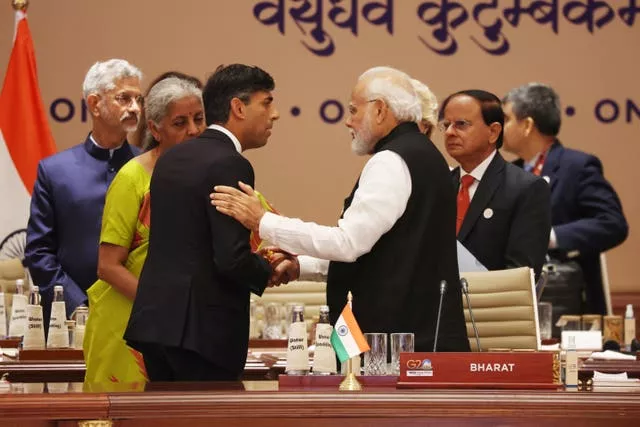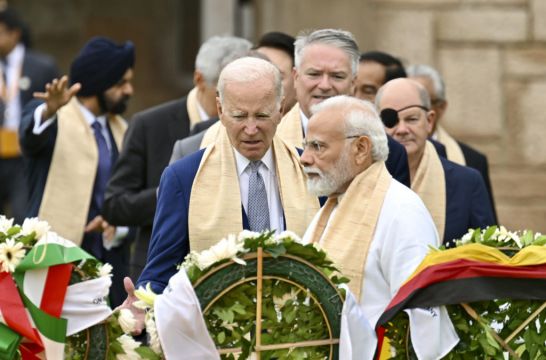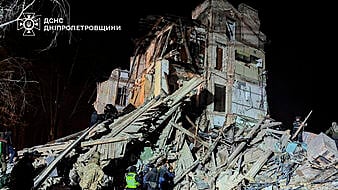India’s prime minister Narendra Modi touted his country as well-placed to bridge gaps in the Group of 20 top economies and solve global problems, but many were sceptical ahead of the weekend’s summit given grave divisions within the bloc over Russia’s war in Ukraine.
He was able to dispel these doubts, announcing a unanimous final agreement a day before the G20 summit ended on Sunday that included language on the European war which both Russia and China signed off on.
Prime Minister Rishi Sunak said the group agreed to a “very strong” message. German chancellor Olaf Scholz called it a “success of Indian diplomacy”, adding “many did not think that would be possible beforehand”. And India’s foreign minister, Subrahmanyam Jaishankar, said the declaration “responds to the situation as it stands today”.

The statement had softer wording than last year’s G20 communique and failed to directly denounce Moscow. Instead, it cited a United Nations charter, saying “all states must refrain from the threat or use of force to seek territorial acquisition against the territorial integrity and sovereignty or political independence of any state”.
But all countries agreed on the declaration, allowing India to claim diplomatic success.
“This is the first declaration without a single footnote or a chair’s summary,” said Amitabh Kant, India’s top G20 negotiator.
Some experts saw the agreement as a win for Russia, while others read it as an achievement for the West. But most concurred it was a foreign policy triumph for Mr Modi as he pushes to increase India’s influence on the world stage.
“India’s statement embodies the voice of the emerging Global South,” said Derek Grossman, an analyst focused on the Indo-Pacific at the RAND Corporation.
“That is a coup for New Delhi, especially within the context of strategic competition against Beijing, helping it to become the leader of this bloc.”
At the summit, Mr Modi also announced the group had agreed to add the African Union as a permanent member and made progress on other key issues important to the developing nations of the Global South.
“We are seeing the G20 finally come into its own as a truly global entity, and emerging from the shadow of the G7,” said Michael Kugelman, director of the Wilson Centre’s South Asia Institute, referring to the Group of Seven major industrial nations.

“It’s emerging as a successful case study of Western and non-Western powers and the Global South working together to pursue shared goals,” he said.
The summit came at a time when Russia and China have been trying to put more emphasis on the more like-minded Brics group — made up of Brazil, Russia, India, China and South Africa — which agreed at its summit last month to expand with six new members.
Russian president Vladimir Putin and China’s leader Xi Jinping skipped the G20 summit this year.
Russian foreign minister Sergei Lavrov, who took Mr Putin’s place at the summit, told reporters the “G20 is going through a crisis” and likened India’s “absolute success” to an “internal reform”.
“This was manifested in the significant activation of members of the Group of 20 from the Global South with the leading role of India, who, very clearly and persistently, sought to take into account their interests,” Mr Lavrov said.
Beijing has been seeking to rally the Global South around a China-centric bloc, and Mr Xi’s absence from the meetings meant that Mr Modi and others were able to “promote their own ideas and goals”, said Michael Schuman, a senior fellow at the Atlantic Council’s Global China Hub.
With his diplomatic approach, Mr Modi emerged as “probably the summit’s big winner”, and someone who was becoming an increasingly important player in international affairs, he said.
“Indian prime minister Narendra Modi showed that he is a force in the developing world as well and has a different vision of the relationship between the developed and developing worlds that is not as confrontational,” Mr Schuman said.

A senior European Union official said it was important not to have ended the summit for the first time without a final communique.
“I think India’s strong leadership has preserved the G20 and opened the space for Brazil in the next presidency to work on global issues,” he told reporters in New Delhi.
Heading into the summit, Mr Modi had argued that the developing countries should have more say, noting that they were disproportionately impacted by many crises including climate change, food shortages and rising energy prices.
Many see that India has laid the groundwork for Brazil and South Africa – both influential members of the Global South – to continue along the same path, as they take the G20 presidency for next two years.
“With the world facing so many borderless challenges and shortages of multilateralism, that type of truly global co-operation is the need of the hour,” Mr Kugelman said.







